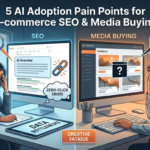Auto parts PPC management is unique and significantly different than selling jeans, handbags, or shoes online.
With fashion and apparel, you have variants of size and color. If you already know the shoe design you want, all you have to do is pick your size and you are done.
When it comes to ppc management for auto parts, the campaigns are different, fitment matters, the available options vary, there are seemingly countless configurations for the aftermarket parts, and competition is increasing fiercely — it’s a dog-eat-dog world!

A customer can buy an auto accessory, replacement parts, aftermarket performance upgrade parts, etc. for the year, make, model, engine, and so on. The auto parts business is a complex to say the least.
The number of available SKUs add to the complexity and necessity of building well structured PPC campaigns to outperform the competition.
PPC ads targeting a casual driver is drastically different than ad copy targeting the hardcore Chevy diesel truck enthusiasts. It truly takes an experienced PPC manager to understand the best way to strategically target their ideal prospect, where they are in the funnel, and how to best manage the budget.
Three Great Reasons for Automotive Businesses to Invest in PPC Management for Auto Parts:
1. Instant Feedback
You can see your results in near-real time. That means your PPC campaigns will start recording clicks and conversion data as it happens.
Unlike any other advertising channel, you can measure the effectiveness of your PPC ads within hours.
Working with an agency that understands the auto parts industry can get your campaigns up and running effectively with the right structure, settings, ad copy, and tactics.
And when you understand the power of Google Ads and Facebook advertising, you’ll really start to understand your opportunity.
2. Targeting
The ability to target your PPC ads to specific customers is powerful — it’s not a guessing game.
We have the ability to target specific states and cities, specific interest like Chevy, Ford, Dodge, or Jeep brands.
Additionally, when we layer retargeting campaigns, new targeting possibilities open up and your ROAS skyrockets!
3. Budget Scaling
With PPC ads, you control how much you spend every single day.
This allows you to increase your PPC budget if when your ROI is good, and lower your spend when things are not looking too hot.
By controlling your budget, your PPC agency can make sure that your ad spend is managed efficiently.
PPC advertising is arguably the best way to spend your auto parts advertising dollar.
Pay-per-click is easy to track, easy to optimize for efficiency, and easy to budget for.
Whether it’s in search or social media, PPC ads just make sense for auto parts businesses to drive the most relevant website traffic that convert into sales.
At Fullmoon, we help businesses in the auto parts and accessories industry manage pay-per-click advertising for:
- eCommerce retailers to drive more sales through PPC advertising
- manufacturers can promote their brand to new customers, and also advertise products
Even though every auto parts and accessories business sell similar products, each business will have it’s unique messaging and value proposition.
Additionally, if your auto parts business has retail locations, then your PPC ads will include both local campaigns to drive in-store traffic and your national online campaign to drive online sales.
What do we look at with our auto parts clients
Our PPC management service follow a framework that we’ve been using for every client — and it works.
Whether you’re a small or medium auto parts business, this approach is equally effective. Because it’s not about the size of your business. We focus on the outcome of your campaigns.

Knowing your audience
It is important to know who you want to reach and what they are looking to buy. Before any campaign can be created, you need to be clear on who you are creating ads for.
We work with auto parts retailers to define their audience by understanding their business, looking at analytics data, and using various research tools to uncover opportunities.
Once the audience is identified, you can match the structure of your campaign to your categories, products, and landing pages.
Targeting with precision
Bidding on keywords like “auto parts,” or “car parts” will not get you the ROI you want, especially if you have a smaller advertising budget.

The volume for such generic keywords is massive and the click costs averages around $1 per click.
Companies with large advertising budgets can compete for that top funnel traffic, capture the visitors email, and retarget them later on.
But auto parts businesses with a modest advertising budget should focus on more specific and narrow searches.
For example, if your business specializes in diesel performance parts for Chevy trucks, then your PPC strategy would be more effective targeting Chevy diesel truck models, instead of generic terms like “diesel truck parts.”
We’ve seen this more often than we’d like.
PPC accounts that we take over from previously managed agencies do not put in the time to be precise with their targeting tactics.
It does take a lot of time to build campaigns — ad copy, keywords, creative — that target specific vehicles by the make, model, year and configurations.
But in the end, for your PPC campaign to succeed, that’s what the auto parts business requires.
Tracking accurately
Define your metrics for success. There are several valuable PPC metrics that are worth monitoring.
They allow you to track and analyze multiple views of your accounts and campaigns.
In short, PPC is driven by data.
Setting up your tracking pixel is extremely important — knowing where your website visitors come from, what products they’re browsing, what actions are they taking, and what customers are buying are all data points that will provide you with insights to grow and scale your business.
Ad copy testing
I have a confession. I am obsessed with testing.
In fact, I was one of the early adopters of Optimizely, right after Google shut down the Google Site Optimizer. Ahhhh….the good’ol days.
But I digress.
Testing your ads should be an on-going exercise your PPC agency does for you. And that’s precisely what we do for our auto parts clients.
Like it or not, customers change behavior and search patterns periodically. Certain words may resonate one year, and be out the next.
By testing the words and phrases you use in your ad copy, you can quickly identify the winners and get rid of the losers.
And then you introduce new challenger ads into the mix, and start the testing all over again.
Yes, ad copy testing is rigorous and requires patience and attention to detail. But if you want your auto parts business to win, this is what your PPC agency must do.
We talked at length about PPC ad copy tips in our previous article. If you are managing your own PPC campaigns, this will help you make it better. I promise.





